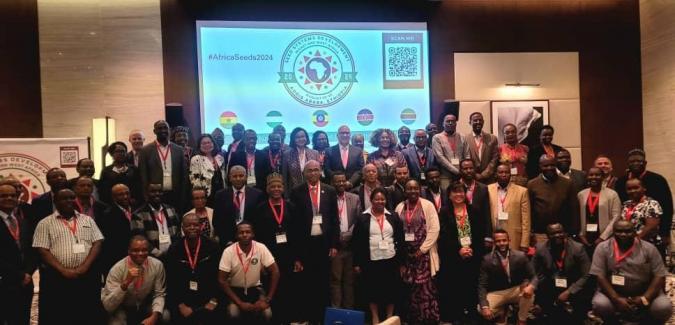Ames, Iowa, USA
March 2025

African farmers produce food that sustains millions, yet they face a formidable barrier: limited access to quality seeds, the most critical input for sustainable agricultural productivity. Cognizant of this challenge, the Seed Science Center (SSC) at Iowa State University (ISU) convened in Addis Ababa, Ethiopia last August a seminar-workshop on Seed Systems Development in East and West Africa. Recommendations from the event were compiled in the publication Recommendations for Advancing East and West African Seed Development and Investment Plans: Strategies for Increasing Smallholder Farmers’ Access to Quality Seed for Food Security and Climate Resilience, the Center released last December.
The book is part of a four-year effort supported by the U.S. Department of Agriculture’s Foreign Agricultural Service (FAS) to integrate biotechnology innovations in seed systems and boost seed trade across Asia and Africa. It outlines action items to advance seed development and investment plans in five focus countries (Ethiopia, Ghana, Kenya, Nigeria, Tanzania), as well as the East and West regions of the continent. It is expected to mobilize resources, inform future technical assistance initiatives, and attract investments to East and West Africa’s seed sector.
“Despite the progress made in seed systems development, smallholder farmers in many African countries still face significant barriers in accessing quality seed,” said Dr. Lulu Rodriguez, SSC’s Global Programs Lead. “This report is designed to provide a roadmap for overcoming these challenges by pinpointing stakeholder groups, assessing their assets, taking stock of resources, and prioritizing investments in seed research and development.”
Recommendations for Seed Sector Growth
In the seminar-workshop, 70 participants from 12 countries formed three working groups that arrived at the following strategic recommendations:
- Strengthen public-private partnerships to streamline seed production and distribution.
- Harmonize seed policies to facilitate regional trade and improve regulatory efficiency.
- Increase investment in biotechnology and plant breeding innovations to enhance the crops’ climate resilience.
- Improve seed certification and quality assurance systems to boost farmer confidence and market access.
- Expand farmer outreach, training, and advisory services to breach the last mile in quality seed distribution.
“These recommendations serve as a call to action,” said Dr. Rodriguez. “They provide clear, actionable steps for policymakers, researchers, and industry leaders to work together in ensuring that high-quality seed reaches those who need it most at the right place, the right price, the right time.”
Dr. Rodriguez goes on to emphasize the report is a veritable guide on how to move forward with national and regional seed plans. “By aligning policies, increasing knowledge-sharing, and fostering stronger collaborations, we can create seed systems that are more efficient, inclusive, and capable of supporting smallholder farmers in the face of climate change,” Dr. Rodriguez said.
The seminar-workshop in Addis Ababa constitutes the third phase of the project “Agricultural Biotechnology and Seed Systems Development in Asia and Africa,” which began in 2021. The first two phases involved the online and onsite training in Ames, Iowa of seed executives and policymakers, regulators, scientists, and researchers on the biotechnology value chain. This capacity building effort aimed to support the incorporation of biotech and new breeding techniques into seed sector initiatives. It was also intended to assist participants in developing functional biotech regulatory frameworks for their respective countries.
For more information about the ISU Seed Science Center and its engagements in Africa, visit seeds.iastate.edu.